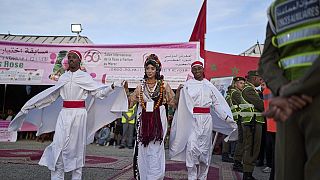Morocco
Moroccan Foreign Minister Nasser Bourita says his country is "keen" to maintain "strong ties" with Libya after meeting with member of the Libyan Presidential Council Abdullah al-Lafi in Rabat.
During a joint press briefing , Mr. Bourita stated that Morocco will stand by Libya unconditionally, to help promote security and stability of the country.
"Our meeting focused on two main points: the first is the bilateral relations between the two countries and the very strong and deep ties that bind the two brotherly peoples. I conveyed to the Vice President of the Libyan Presidency Council (Abdullah al-Lafi) that His Majesty the King is keen to maintain these strong ties between the two people."
Abdullah al-Lafi , the visiting member of the Libyan Presidential Council replied saying,
"We have just confirmed with his excellency the Foreign Minister a meeting between the two Libyan and Moroccan consular commissions that will be held next week to settle all the problems of obtaining visas and to follow-up on the flights file. Surely this commission will play a positive role to alleviate the suffering for both, the Libyan and Moroccan people."
According to the moroccan minister, the issue of national reconciliation, remains an essential factor to overcome the past and foster unity among all parties, especially as elections draw near in Libya.
He stressed that Morocco, which has led an exemplary process in this field through the Equity and Reconciliation Commission, is willing to share its experience and guide Libya.













01:41
Trump’s comments on Boakai’s English met with mixed reactions
01:19
"Such good English": Trump compliments Liberian president, a native English speaker
01:54
"Great economic potential in Africa": five African leaders have lunch with Trump
01:24
EU to seek tougher measures from Libyan authorities on Mediterranean migrant sea crossings
Go to video
Moroccan museums open doors for free to inspire youth pride and cultural connection
01:50
UN urges renewed political and climate action in Libya amid humanitarian and governance crises